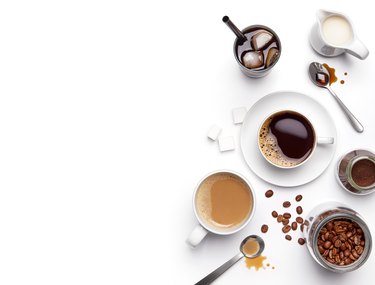
For most people, drinking coffee is part of a daily routine. But for some individuals, that cup of joe can result in uncomfortable stomach bloat. There are a number of reasons why you may experience coffee bloating, and not all of them have to do with the coffee itself.
Read More: Can Coffee Cause Bloating?
Video of the Day
Video of the Day
Bloating and Digestive Issues
If you've found yourself saying, "Caffeine makes me bloated," there could be multiple reasons why. Bloating can be caused by, among other things, indigestion and gastrointestinal disorders like Irritable Bowel Syndrome (IBS). In a May 2016 article published in The Journal for Nurse Practitioners, researchers found in an IBS study of 330 patients, coffee was one of the top 10 foods that caused bloating and produced IBS symptoms. Triggering IBS symptoms can lead to further discomfort and stomach bloating.
Coffee doesn't cause gastrointestinal issues (GI) in everyone. But a March 2016 study published in Nutrition Journal found that in the minority of individuals who were sensitive to caffeine, drinking coffee was linked to GI issues like bloating. A June 2018 report in the Institute for Scientific Information on Coffee lists genetics, alcohol intake and diet all as factors that affect caffeine sensitivity, or how quickly you're able to metabolize caffeine in your body.
Read More: 10 Ways to Beat Belly Bloat
Even for regular coffee drinkers, consuming an excessive amount of caffeine can cause an upset stomach. The FDA recommends a daily maximum of 400 milligrams of caffeine (or approximately 4 or 5 cups of coffee), though individual variations should be taken into account.
One possible solution to curb digestive issues is to change the roast of your coffee. Caffeine stimulates gastric acid secretion, which helps your stomach digest food, but this acid production is thought to also cause gut irritation. In a June 2014 article in Molecular Nutrition & Food Research, researchers found that in healthy volunteers, dark roast (compared to medium roast) coffee reduced gastric acid secretion, and thus could be easier on the stomach. Dark roasted coffee beans are roasted for longer or at a higher temperature than medium or light roasted beans, which reduces their caffeine content.
Read More: The Reasons for Bloating & a Full Feeling
Bloating and Lactose Intolerance
If you take your coffee with cream or milk, the resulting coffee bloating may not be due to the beans, but the dairy you're putting in your mug. Milk and milk products contain a natural sugar, lactose, that not everyone's bodies can effectively break down, leading to bloating and gas.
Lactose intolerance is a fairly common food intolerance. Per a July 2017 review in The Lancet: Gastroenterology & Hepatology, lactose malabsorption (a digestive symptom of lactose intolerance) is widespread, affecting 68 percent of the world's population.
To reduce stomach bloating from dairy, you can change your diet to reduce or avoid lactose products altogether — opt for lactose-free milk or add dairy alternatives like nut, soy, rice, coconut or oat milks, but pay attention to any other food intolerances you may have.
Read More: Should You Cut Dairy From Your Diet?
Bloating and Artificial Sweeteners
One other culprit of your belly bloat could be the sweetener you're adding to your coffee. Although artificial sweeteners and sugar substitutes may be lower in calories, they are not necessarily healthier than regular sugar.
Sugar alcohols like sorbitol and maltitol are not easily digested by the body. An October 2016 review in the Journal of International Dentistry showed that sugar alcohols, when consumed in large quantities, can cause laxative effects, diarrhea, excessive gas and bloating. A September 2018 paper published in Molecules also found that artificial sweeteners can be toxic to your gut's digestive microbes.
- John Hopkins Medicine, Health: "Bloating: Causes and Prevention Tips"
- The Journal for Nurse Practitioners:"Addressing the Role of Food in Irritable Bowel Syndrome Symptom Management"
- Nutrition Journal: "Acute Effects of Coffee Consumption on Self-Reported Gastrointestinal Symptoms, Blood Pressure and Stress Indices in Healthy Individuals"
- Coffee & Health: "Genetics, Metabolism and Individual Responses to Caffeine"
- FDA: "Spilling the Beans: How Much Caffeine is Too Much?"
- Proceedings of the National Academy of Sciences USA :"Caffeine Induces Gastric Acid Secretion via Bitter Taste Signaling in Gastric Parietal Cells"
- Molecular Nutrition & Food Research: "A Dark Brown Roast Coffee Blend Is Less Effective at Stimulating Gastric Acid Secretion in Healthy Volunteers Compared to a Medium Roast Market Blend"
- American College of Gastroenterology: "Belching, Bloating, and Flatulence"
- The Lancet: Gastroenterology & Hepatology: "Country, Regional, and Global Estimates for Lactose Malabsorption in Adults: A Systematic Review and Meta-Analysis"
- International Journal of Dentistry: "Gastrointestinal Disturbances Associated with the Consumption of Sugar Alcohols with Special Consideration of Xylitol: Scientific Review and Instructions for Dentists and Other Health-Care Professionals"
- Molecules: "Measuring Artificial Sweeteners Toxicity Using a Bioluminescent Bacterial Panel"
- National Institute of Diabetes and Digestive and Kidney Diseases: "Eating, Diet, & Nutrition for Lactose Intolerance"